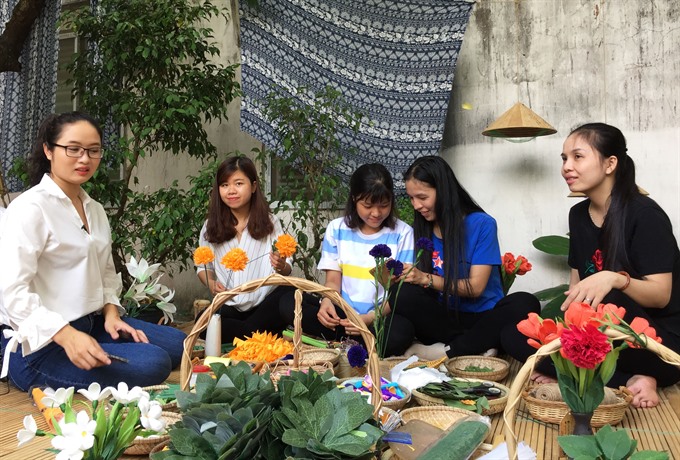[ad_1]

|
| New relationships: The hearing impaired girls in conversation with a lady visiting the facility. VNS Photo Phước Bửu |
by Phước Bửu
Born in the former imperial capital city of Huế, Lê Thị Thanh Nhàn did not want to learn the local paper flower craft. Huế is famous for the craft, especially in the Thanh Tiên paper flower making village on the city’s outskirts.
The 25-year-old girl learned the technique on a YouTube channel and started making saffron crocuses about three years ago. At that time, she was a student at the Huế University of Foreign Languages and also worked part time at a restaurant run by her cousin in the city.
Being a student, holding a part time job and making flowers, too, made Nhàn really busy. She explained that she made paper flowers as her hobby and the earnings from the part time job would help her future projects, so she was happy with all of her work.
“I love flowers and I feel sad at the withering of flora. Thus I want beautiful flowers to last a long time and that drives me to make paper flowers,” she said.
“Of course they can never be forever, but paper flowers will last longer than those grown in nature.
“The love for flowers has helped me learn and acquire the techniques quite fast. During my childhood, I often studied petals of different flowers so making the shapes from paper quickly became familiar to me.
Saffron crocus was the flower which Nhàn found easiest to work on. She made many examples of that flower and began to sell them on her Facebook page. Her friends and acquaintances appreciated her paper flowers and the increasing sales gave her early success in the craft.

|
| Vui: Flowers and the girls at Nhàn’s facility. VNS Photo Phước Bửu |
Then she learned to make other types of flowers, including lotus flowers, roses, Texas bluebells, carnations, sunflowers, peonies and Scorpion grass. Those flowers made Nhàn famous across the city, as well as in the expat community living there.
Young girls wanted her flowers for bedroom decorations, and they also wanted to learn from her skill in the craft. Meanwhile, coffee shops and restaurants in the city and other localities around the country wanted her flowers for their walls, desks, dining tables and backdrop decorations.
Nhàn then formed a club, based at her family’s tiny home in the Kim Long residential area to meet those demands. There, fans of Nhàn and her flowers gathered to create more types of flowers. The club also included also young foreign ladies who have stayed in Huế for a while. She held the club meetings and made flowers in her free time and during weekends.
She sold her flowers abroad as well, thanks to her postings on Facebook and Instagram. Despite the thriving business, Nhàn retained her full time job at a facility offering craft performances and a coffee house for visitors to Huế. But she quit the job in late May, having finally achieved a secret goal.
“For a long time, I have nurtured the idea to build a facility for the disabled to practise crafts. The salary from both the part time and full time jobs helped me save up for my plans,” she said.
“With my early success in the paper flower craft, I insisted that the craft is one of the best ways to help the disabled have a decent job.
“I’m always feeling pity for the disabled and I believe a humble earning from this craft will ease part of their living burden.

|
| Sharing the knowledge: Nhàn (standing) is instructing the girls on techniques, using sign language. VNS Photo Phước Bửu |
Two and a half years ago, Nhàn connected with a girl who was born with “glass bone” syndrome and is confined to bed for the rest of her life. Nhàn trained the girl to be the first disabled artisan in her craft club.
Today Nhàn has her dream facility at 87 Ông Ích Khiêm Street on a small road on the right of the former Imperial Palace’s main entrance.
At the facility, Nhàn showcases her flowers, displays pottery vases and teaches eight hearing-impaired girls to make flowers. The facility also has juice and coffee services by her mother and an American friend.
Nhàn’s mother was too shy to be quoted, but she nodded at the conclusion that her presence at the facility expressed her full support for Nhàn’s work.
Nhàn also has many volunteers working with her at the facility.
“The [disabled] girls look really happy when they are working with Nhàn, so I decided to give a hand to this facility,” said Trần Thị Diệu Trinh, a fresh university graduate.
“I have a happy time here looking at the girls, happy with the craft and communicating with sign language.
Everything is going on smoothly now for Nhàn, but she has greater plans. She is nurturing a project to take care of the glass bone girls she has gotten to know, including the two diamond bone girls to whom she taught the craft two years ago. Their flowers are on display at the facility. VNS
[ad_2]
Source link
